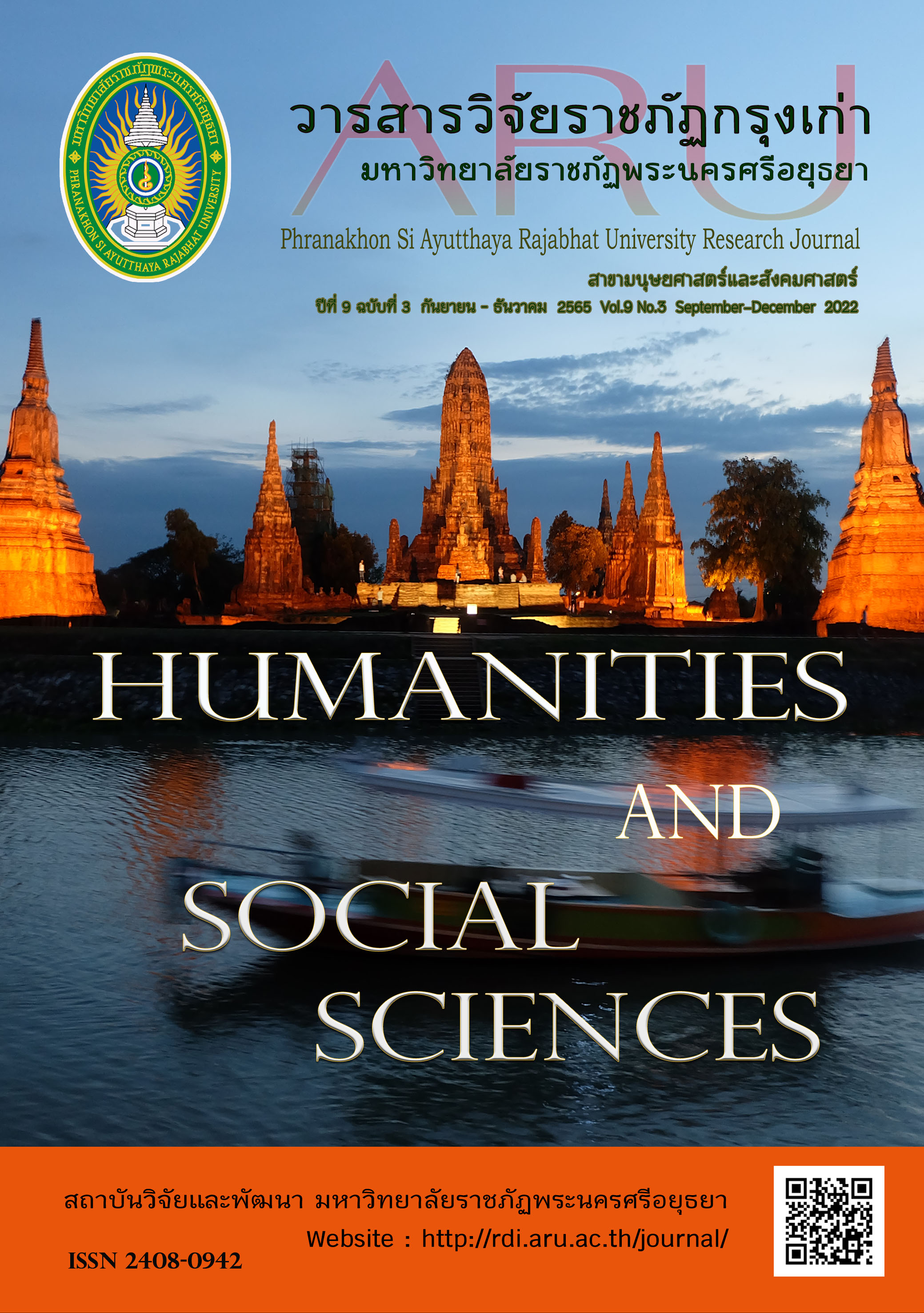The Strategic Leadership in 21st Century of Educational Administrators under the Bangkok Secondary Educational Service Area Office 2
Main Article Content
Abstract
The purposes of this research were to study and to compare the level of teacher’s opinion about strategic leadership in 21stcentury of educational administrators under the Bangkok secondary educational service area office 2. The research has been classified by educational background, work experience, and school size in 2021. The sample consisted of 357 teachers from 52 secondary schools under the authority of Bangkok secondary educational service area office 2, with stratified random sampling. According to Cohen, Manion and Morrison’s formula, the sample size was determined with statistically significant difference level of 0.05. The instruments used for data collection were the questionnaire and five point-rating scale form. The reliability of questionnaire was 0.988. The data analysis was done by percentage, mean, and standard deviation. The hypothesis testing was done by using a t-test for independent samples and One - Way ANOVA. The work of Scheffé’s post hoc comparisons method was used to test the difference between means.
The results of this research were as follows;
1. The overall teachers' opinion about of strategic leadership in 21stcentury of educational administrators under the Bangkok secondary educational service area office 2 as a whole was at a high level. Considering each individual aspect, this study found other aspects were effectively at a high level in descending order of the average as follows; vision and determining the strategic direction, morality and ethics, promoting corporate culture for dynamic core, developing and managing resources.
2. The comparison of the level of strategic leadership in 21stcentury of educational administrators under the Bangkok secondary educational service area office 2 was classified educational background, work experience, and school size. The study performed teachers with different educational background, and work experience had opinion towards the level of the strategic leadership in 21st century of educational administrators. Both overall and individual aspects were not significantly different. Although teachers with different school size had opinion towards the level of the strategic leadership in 21st century of educational administrators with statistically significant difference level of 0.05 in each aspect.
Article Details

This work is licensed under a Creative Commons Attribution-NonCommercial-NoDerivatives 4.0 International License.
Journal of TCI is licensed under a Creative Commons Attribution-NonCommercial-NoDerivatives 4.0 International (CC BY-NC-ND 4.0) licence, unless otherwise stated. Please read our Policies page for more information...
References
กัญญาณัฐ ไชยชะนะ. (2563). ความสัมพันธ์ระหว่างภาวะผู้นำเชิงกลยุทธ์ในศตวรรษที่ 21 ของผู้บริหารสถานศึกษากับประสิทธิผลของสถานศึกษาในอำเภอแม่สรวย สังกัดสำนักงานเขตพื้นที่การศึกษาประถมศึกษาเชียงราย เขต 2 (การศึกษาค้นคว้าด้วยตนเองการศึกษามหาบัณฑิต). มหาวิทยาลัยพะเยา, พะเยา.
ขวัญทิรา ทิราวงศ์. (2563). ภาวะผู้นำเชิงกลยุทธ์ของผู้บริหารสถานศึกษา สังกัดสำนักงานเขตพื้นที่การศึกษามัธยมศึกษาเขต 37 (การศึกษาค้นคว้าด้วยตนเองการศึกษามหาบัณฑิต). มหาวิทยาลัยพะเยา, พะเยา.
จักรพันธุ์ จันทร์เจริญ. (2564). ภาวะผู้นำเชิงกลยุทธ์ในศตวรรษที่ 21 ของผู้บริหารสถานศึกษาที่ส่งผลต่อแรงจูงใจในการปฏิบัติงานของครู โรงเรียนเอกชน สังกัดสำนักงานคณะกรรมการการศึกษาเอกชน (สช.) ในภาคตะวันออกเฉียงเหนือตอนกลาง. วารสารวิชาการ มหาวิทยาลัยนอร์ทกรุงเทพ. 10(2). 45-60
จิตรลดา พระสุราช และจารุวรรณ เขียวน้ำชุม. (2564). ภาวะผู้นำเชิงกลยุทธ์ในศตวรรษที่ 21 ของผู้บริหารสถานศึกษาที่ส่งผลต่อการจัดการเรียนรู้เชิงรุกของครูในโรงเรียนสังกัดสำนักงานเขตพื้นที่การศึกษา ประถมศึกษานครพนม เขต 2. วารสารวิชาการสถาบันการอาชีวศึกษาภาคใต้ 1. 6(1), 32 – 44.
ดุลคิพลี หลังจิ และเอกรินทร์ สังทอง. (2564). ภาวะผู้นำเชิงกลยุทธ์ของผู้บริหารที่ส่งผลต่อการเป็นองค์การแห่งการเรียนรู้ ของโรงเรียนเอกชน สังกัดสำนักงานการศึกษาเอกชนจังหวัดยะลา. วารสารวิจยวิชาการ. 4(4), 93-106.
บุญชม ศรีสะอาด. (2560). การวิจัยเบื้องต้น (พิมพ์ครั้งที่ 10). กรุงเทพฯ: สุวีริยาสาส์น.
รุ่งนภา นิรงบุตร. (2561). ภาวะผู้นำเชิงกลยุทธ์ของผู้บริหารสถานศึกษา สังกัดสำนักงานเขตพื้นที่การศึกษาประถมศึกษา (วิทยานิพนธ์ครุศาสตรมหาบัณฑิต). มหาวิทยาลัยราชภัฏวไลยอลงกรณ์ฯ, ปทุมธานี.
วัชรพงษ์ สำราญรมย์. (2561). ความคิดเห็นของข้าราชการครูต่อภาวะผู้นำเชิงกลยุทธ์ของผู้บริหารสถานศึกษาสังกัดองค์การบริหารส่วนจังหวัดนครราชสีมา (ปริญญานิพนธ์ครุศาสตรมหาบัณฑิต). มหาวิทยาลัยราชภัฏชัยภูมิ, ชัยภูมิ.
สำนักงานเขตพื้นที่การศึกษามัธยมศึกษากรุงเทพมหานคร เขต 2. (2564). ทิศทางการขับเคลื่อนสำนักงานเขตพื้นที่การศึกษามัธยมศึกษากรุงเทพมหานคร เขต 2. สืบค้นจาก https://www.sesao2.go.th/wp-content/uploads/2021/12/%E0%B8%97%E0%B8%B4%E0%B8%A8%E0%B8%97%E0%B8%B2%E0%B8%87%E0%B8%81%E0%B8%B2%E0%B8%A3%E0%B8%82%E0%B8%B1%E0%B8%9A%E0%B9%80%E0%B8%84%E0%B8%A5%E0%B8%B7%E0%B9%88%E0%B8%AD%E0%B8%99.pdf.
สำนักงานเลขาธิการสภาการศึกษา. (2560). แผนการศึกษาแห่งชาติ พ.ศ. 2560 – 2579. กรุงเทพฯ: พริกหวานกราฟฟิค.
อภิชญา จะเรียมพันธ์. (2563). ภาวะผู้นำเชิงกลยุทธ์ของผู้บริหารโรงเรียนประถมศึกษา สังกัดสำนักงานเขตพื้นที่การศึกษาประถมศึกษาสมุทรสาคร (การศึกษาตามหลักสูตรศึกษาศาสตรมหาบัณฑิต). มหาวิทยาลัยศิลปากร, นครปฐม.
อำนวย มีราคา. (2564). การศึกษาภาวะผู้นำเชิงกลยุทธ์ของผู้บริหารสถานศึกษาโรงเรียนพระปริยัติธรรมแผนกสามัญศึกษา กลุ่มที่11 ศรีสะเกษ นครราชสีมา ชัยภูมิ บุรีรัมย์ และสุรินทร์. วารสารวิชาการ มจร บุรีรัมย์. 6(1), 134-145.
Cohen, L., Manion, L., & Morrison, K. (2011). Research in education (7th ed.). New York: Roatledge.Dubrin, A. J., & Andrew. (2007). Leadership research findings, practice, and skills (5th ed.). Boston: Houghton Mifflin.
Hitt, M. A., Haynes, K. T., and Serpa, R. (2010). Strategic leadership for the 21st century. Business Horizons, 53(5), 437-444.
Hitt, M. A., Ireland, D.R, and Hoskisson, E. R. (2005). Strategic Management (7th ed.). United States of America: Thomson.


